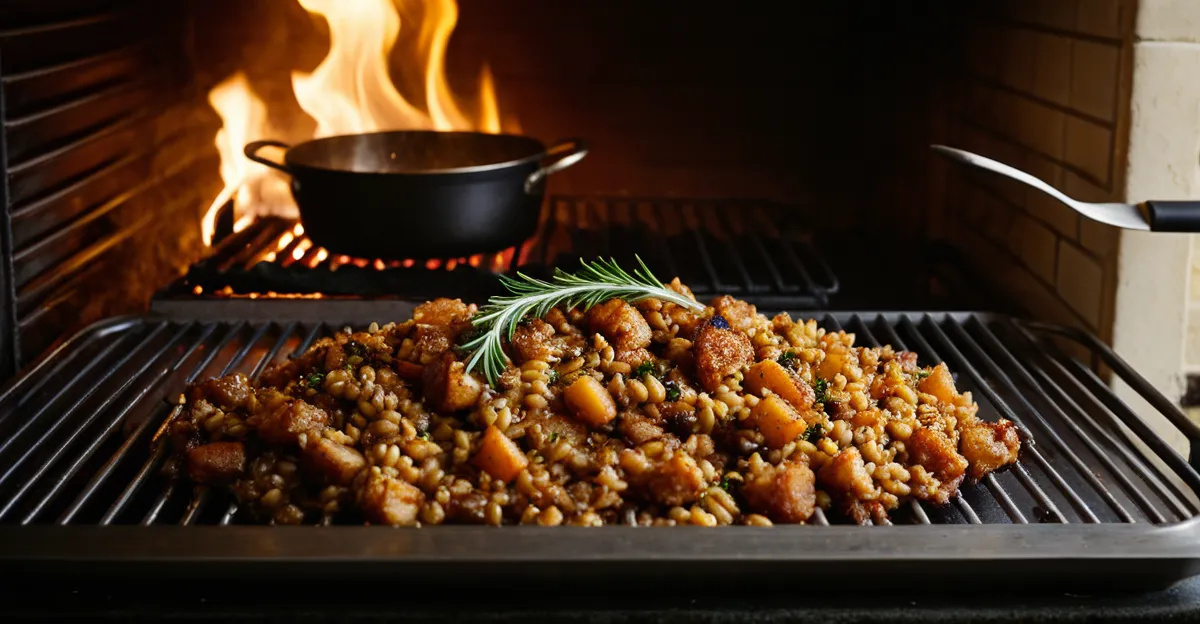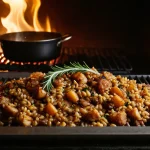Key Traditional UK Cooking Techniques and Their Culinary Roots
Traditional British cooking methods such as roasting, baking, boiling, stewing, and grilling have played a fundamental role in shaping the history of UK cuisine. These techniques provide a culinary backbone for classic British dishes that vary regionally but share a common heritage.
Roasting is central to iconic meals like the Sunday roast, involving meat and vegetables cooked in dry heat to develop rich flavors and textures. Meanwhile, baking is essential for breads and savory pies such as steak and kidney pie, reflecting the historic reliance on hearty, portable foods.
Also to read : What are the most exciting kitchen appliance innovations in the UK?
Boiling, often used for vegetables, potatoes, and puddings, speaks to practical cooking traditions developed in working-class kitchens. Stews, like Lancashire hotpot, emerge from stewing, a slow cooking method ideal for tough meats and root vegetables, emphasizing economical and filling meals.
Lastly, grilling—originally a method for open-fire cooking—remains popular for preparing meats and fish, adding a charred, smoky dimension. These traditional British cooking methods not only reflect the history of UK cuisine but also continue to define its robust and comforting character.
This might interest you : What are the key features of a modern UK kitchen layout?
Endurance and Adaptation of Traditional Techniques in Modern Cooking
Traditional British cooking methods continue to form the foundation of modern British cuisine, even as culinary evolution introduces fresh ideas. Contemporary chefs preserve these heritage cooking techniques by maintaining core practices like roasting, baking, and stewing, but often introduce subtle alterations to enhance flavor, texture, or presentation. For example, slow roasting in traditional British cooking methods may now incorporate precise temperature controls to achieve perfect tenderness while retaining authenticity.
Heritage cooking techniques also remain prominent in notable modern British restaurants. Chefs frequently showcase classic British dishes that employ familiar methods like grilling or boiling but elevate them with innovative ingredients or plating styles. This respect for traditional bases ensures dishes connect deeply with the history of UK cuisine while appealing to contemporary palates.
Moreover, fusion with global influences and new ingredients enriches these timeless methods. Stewing—once associated with rustic, economical meals—might now include exotic spices or premium cuts, blending tradition with creativity. Similarly, baking serves as a canvas for experimenting with diverse grains or artisanal processes, highlighting the adaptability of traditional British cooking methods in today’s ever-changing culinary landscape.
Case Studies: Chefs and Dishes Bridging Tradition and Innovation
Exploring how British chefs balance recipe adaptation with culinary innovation reveals a dynamic dialogue between heritage and modernity. Contemporary reinterpretations of classic UK dishes often begin by respecting foundational cooking methods, such as roasting and stewing, which anchor the flavours in tradition. For example, a slow-cooked lamb stew might be enriched with globally inspired spices, showcasing innovation while preserving the essence of stewing.
Chef perspectives emphasize the importance of honouring tradition by maintaining recognizable elements that evoke the rich history of UK cuisine. At the same time, they advocate for creative freedom, adapting techniques to suit today’s tastes and dietary preferences. This approach encourages experimentation without losing sight of authenticity.
Modern menus prominently feature heritage techniques, reflecting a revival of interest in time-tested methods like baking and grilling. Restaurants use these to craft dishes that are visually appealing and flavorful yet deeply rooted in British food culture. Techniques such as precise roasting temperatures are embraced to enhance texture and taste, ensuring classic dishes remain relevant and alluring to contemporary diners. This blend of tradition and innovation exemplifies the ongoing evolution of British gastronomy.
The Cultural Impact of Traditional Techniques on British Food Identity
Traditional British cooking methods have deeply influenced British food culture, becoming a cornerstone of the nation’s culinary heritage. These methods—roasting, baking, boiling, stewing, and grilling—do more than prepare food; they connect people to shared histories and regional identities, fostering a sense of belonging.
The role of these techniques in British food education is significant. Many home cooks learn fundamental skills through age-old practices, promoting consistency and respect for culinary heritage. Schools and cooking classes often emphasize traditional methods, ensuring new generations appreciate the foundations of UK cuisine.
In a globalised world with diverse culinary influences, the preservation and celebration of traditional British cooking uphold national identity. Cooking techniques are not merely recipes but represent cultural narratives passed down through families and communities. This cultural endurance maintains pride in classic British dishes while encouraging adaptation that respects origin.
The continued use of these methods shapes evolving British food culture, bridging past and present. As British food celebrates diversity, it retains its unique flavour through heritage techniques that cultivate a shared culinary language and a distinctive national identity.






